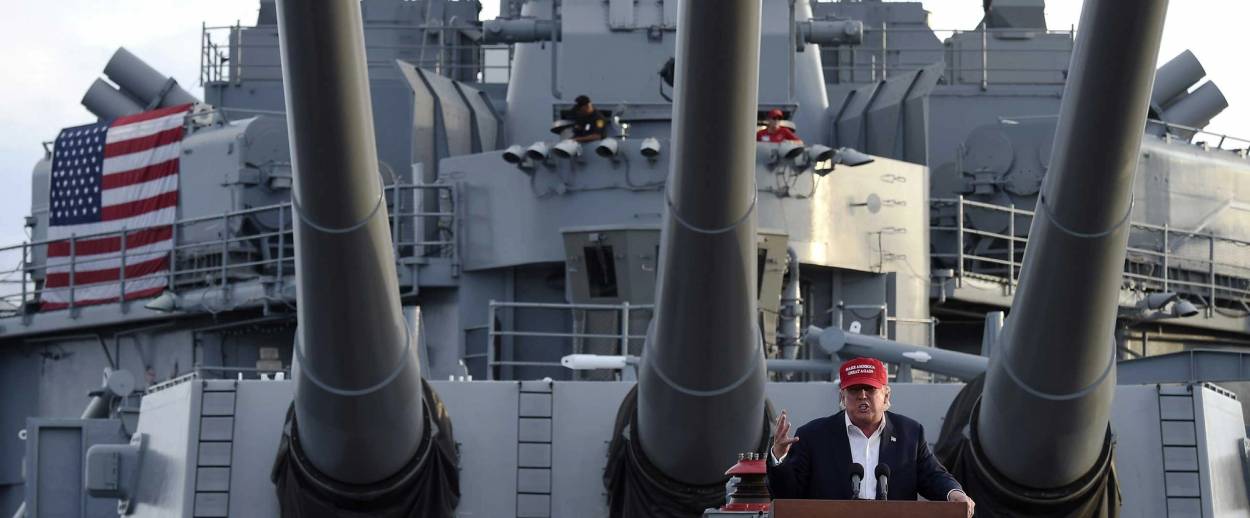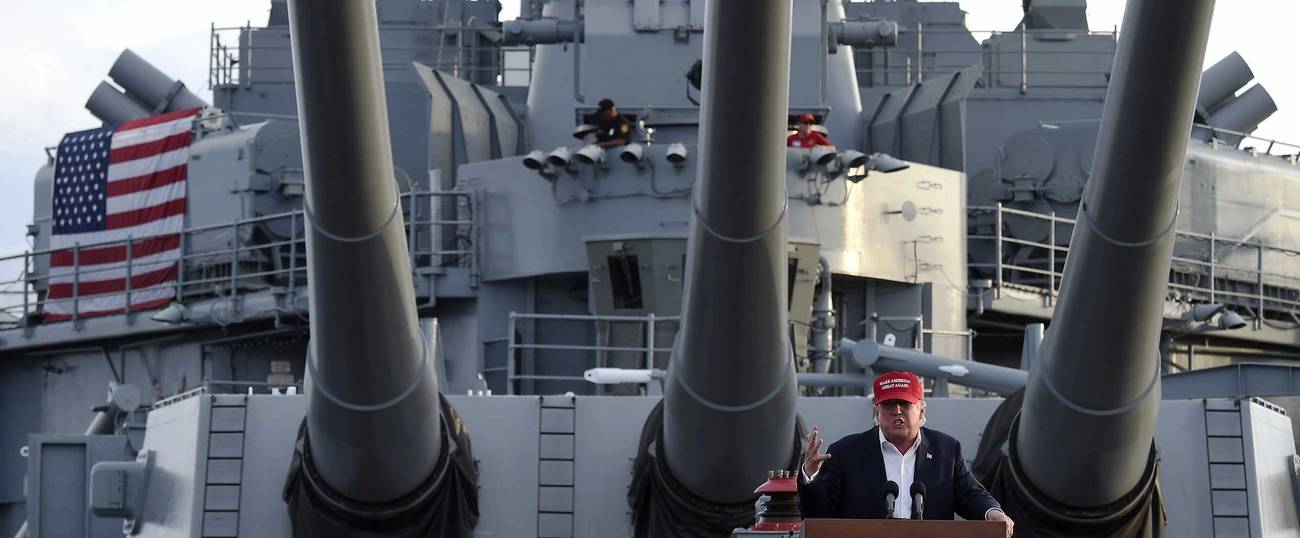Some of My Best Friends Are Jewish
A group of influential Republican hawks—many of them Jewish—wrote a letter disavowing Donald Trump last year. Here’s how they feel about him now.




In mid September 2015, Donald Trump prepared to give what had been billed as his first foreign policy address, aboard a battleship docked in Los Angeles. Supporters of his rivals for the Republican presidential nomination pricked up their ears. Trump had by then made some striking remarks about global affairs, suggesting painful tax increases for U.S. trading partners, and proposing that allies be made to pay more dearly for military protection. He had implied that many illegal immigrants from Mexico were drug dealers and rapists, and spoken approvingly of Russia’s despotic president, Vladimir Putin. But his statements didn’t add up to a cogent worldview, which supporters of Trump’s competitors could counter. Perhaps, they thought, this speech would provide some red meat.
One prominent Jewish Republican, a lawyer and a fellow at a conservative think tank, was working for Marco Rubio’s campaign. He asked a colleague to watch Trump’s speech and report back on its content. But after the speech, the lawyer didn’t hear anything. “There was nothing in my inbox,” he recalled recently. “I pinged the guy and asked, ‘Can you tell me what [Trump] said?’ ” He received a one-word reply: “Nothing.” The lawyer pressed further, but his colleague insisted: “I’m telling you, Trump said absolutely nothing.” The lawyer remembered, “What was supposed to be this big foreign policy speech was just circumlocution—a lot of adjectives, not actually modifying any particular statement. That was a concern.”
It was to this iteration of Trump—alarming, offensive, but maddeningly vague about particulars—that a bloc of influential Republicans was responding early last March, when they signed an open letter opposing his candidacy. Made up of professionals from the foreign policy and national security communities, the letter’s 121 signatories were largely neoconservatives—members of the hawkish movement that has characterized mainstream Republican foreign policy thinking for the last three decades. Many were Jewish academics and strategists who’d held high-level posts in the Reagan and Bush Administrations. Google a handful—Michael Chertoff, Max Boot, Philip Zelikow, Dov Zakheim, and Robert Kagan, say—and you will turn up non-negligible roles in the Iraq War and the Patriot Act, executive positions at hard-right political consultancies, bylines at The Weekly Standard, and prestigious university appointments. (You will also get bilious blog posts authored by paranoid anti-Semites and Sept. 11 conspiracy theorists denouncing these men.) For these career ideologues who had relied for their influence on sharp wits and a rigidly defined weltanschauung, Trump’s erratic, unprincipled pronouncements were anathema.
Since then, Trump’s stated positions have become somewhat more coherent, but no less dismaying to the letter’s signers. Speaking at length late last March to the Washington Post and the New York Times, Trump explicitly repudiated neoconservative doctrine—rejecting the nation-building, democratic evangelism, and generally pugnacious diplomatic stance that have distinguished recent Republican presidencies. The United States, Trump said, had already spent too many resources policing the globe; it was time that someone else took the lead. Beneath Trump’s bluster, the Post political correspondent Dan Balz found “an inward-looking politician whose views represent a dramatic break with years of Republican Party orthodoxy.”
That Trump is now all but certain to win the Republican nomination raises questions about just how important that orthodoxy was to the party in the first place. In a recent post at Medium, Republican strategist Patrick Ruffini points out that Trump has relied on many of the same voters who gave John McCain and Mitt Romney easy primary wins. And yet, it’s difficult to say what Trump, McCain, and Romney share that might attract the same voters to all three candidates. “Trump’s coalition isn’t easily pigeonholed ideologically,” Ruffini writes. “It relies on more casual, less-educated voters attracted to Trump’s personality rather than to any specific brand of Republicanism … it’s a preference for the strongest horse, one that doesn’t demand that they first embrace a specific set of ideological precepts.”
A preference for the strong horse is a widely shared American tradition, and Trump has mustered support from dozens of current and former Republican senators, congressmen, governors, mayors, state legislators, and military officials. He has the imprimatur of more mainstream politicians like Chris Christie and Rudolph Giuliani. “Policy matters a good deal less than we think in elections, but what if it matters hardly if at all?” Ruffini asks. “If that’s the case, the powerlessness of appeals based on ideology, even within the Republican Party, is something that should reset the worldview of a great many people who do this for a living.” Which leaves the Jewish policy wonks of the Reagan and Bush Administrations and the principles they promoted with such vigor seem, suddenly, quite irrelevant to the identity of the Republican Party.
***
In recent weeks, I contacted about a dozen signers of the Trump open letter to gauge their feelings about their place in the party where they have made their homes and careers. Several sought to distance their party from Trump, the interloper, while others expressed a sense of suddenly being homeless. All expressed dismay about the long-term damage Trump would do to their party, to American democracy, and to the global standing of the country.
Roger Zakheim, a visiting fellow at the American Enterprise Institute and a former deputy staff director of the House Armed Services Committee, told me that he simply declines to categorize Trump as a Republican. “I think whether you look at domestic policy, in terms of the role and size of government, or at foreign policy, with respect to how he talks about trade, the role of the U.S. in the world, the role of the military—these are places where Trump goes beyond the bounds of the Republican Party,” Zakheim said. “He crosses over into nativism.”
Eliot Cohen, a co-organizer of the letter and a former State Department official in the George W. Bush Administration, offered a kind of interpolation of that analysis. (Though it is often applied to him, Cohen disavows the “neoconservative” label.) Any party led by Trump—whatever its name—wouldn’t deserve the title of the “Party of Lincoln,” Cohen said: “The point is that what’s important is the idea, versus a particular organization.” In a recent essay for The American Interest, he elaborates, writing, “If the Republican Party accepts Trump it will lose its soul, and it will become necessary to find an alternative: a different candidate, and quite possibly a new party.” Cohen goes on to highlight a theme that surfaced early in each of my interviews: “The United States has benefited enormously from the global order we have helped establish since World War II. A selfish, cramped nationalism, or worse, neo-isolationism, will eventually bring disaster to others, and then to us.”
When I reached him by phone, Dov Zakheim, who served as Deputy Undersecretary of Defense for Planning and Resources under Reagan and as a foreign policy adviser for George W. Bush, noted that Trump’s statements about U.S. policy in Asia gave him particular pause. (Dov Zakheim is Roger Zakheim’s father.) “At the time [Zakheim signed the letter], it looked like Trump would potentially alienate our allies,” he said. “Now he’s alienated them. He’s spoken the unspeakable—that he could live with a nuclear Japan, a nuclear Korea. We’ve spent the last 60 years making sure Japan never reverted to the militarism that previously characterized the country. Trump says, ‘I don’t care.’ ”
Objections to Trump’s suggested shifts in diplomacy are not limited to the Far East. “His comments about NATO being irrelevant are ill-informed at best,” said David Kramer, a former State Department official in the George W. Bush Administration, referring to a Trump campaign speech in Wisconsin in which he expressed equanimity about the prospect of NATO’s breakup. Kramer also said that he found Trump’s characterization of U.S. allies as “freeloaders”—one he has deployed repeatedly—unfavorably similar to President Obama’s.
Aaron Friedberg, a former national security adviser to Dick Cheney and Mitt Romney, told me that Trump’s inclination toward military reticence concerned him particularly in light of current conditions: “The situation in the world to some extent resembles the 1930s, with the growing power and audacity of authoritarian regimes challenging the international system: China, Russia, Iran.” Friedberg continued, “The U.S. is still the main break on those tendencies, which are emboldened by the perception that we’re preoccupied, that resolve is lagging.” In a recent interview with Vox, Max Boot, a former foreign policy adviser to John McCain, Mitt Romney, and Marco Rubio, noted that Trump actually seems to prefer authoritarian regimes to U.S. allies. “He loves dictators,” Boot said. “He praises Putin, he loved the Tiananmen Square crackdown, he praises Kim Jong-Un. At the same time, he saves his venom for democratic allies like South Korea, Japan, and Germany. That’s because, as he’s repeatedly said, he admires strength and leadership, and people like Putin have it.”
But despite their eagerness to dismantle his positions, virtually all the people I spoke with seemed to suspect that Trump had not really developed any ideas since that first foreign policy address last September, when Rubio’s campaign workers could identify nothing substantive enough to take notes on. As examples of Trump’s cluelessness, they held up the fact that in a December debate, he did not understand the phrase “nuclear triad”—a term for the United States’ land-air-and-sea launch capacity—and his comments on the Israeli-Palestinian conflict, which he has said he would approach neutrally, as though brokering a real-estate deal. In fact, they suggested, Trump appeared to have no strong views on foreign policy matters at all.
Most of the people I talked to said that their Jewishness did not motivate their opposition to Trump. Several, however, expressed concern that the bigotry Trump has so far directed at Muslims and Mexicans—tempting the worst impulses of the same voters who could once be counted on to cast their ballots for the “Party of Lincoln”—might also be turned on American Jews. “I find it difficult to see how some Jewish voters don’t recognize the danger in someone like this,” Aaron Friedberg said. “If you pay attention not so much to what he’s saying, but to the people and attitudes that he’s brought to the surface—I think there’s a lot of racism and anti-Semitism there.”
That supposition was borne out in April when the journalist Julia Ioffe became the target of anti-Semitic abuse after she published a not-entirely-flattering portrait of Trump’s wife, Melania, in GQ. Dov Zakheim shares Friedberg’s uneasiness. “Once you start that ball rolling toward racism, at some point, Jewish Americans will be caught in that avalanche,” he said. I pointed out that Trump’s daughter, Ivanka, and his son-in-law, the New York real-estate developer Jared Kushner, were Jewish. “Sure,” Zakheim said. “But what’s the favorite slogan of many anti-Semites? ‘Some of my best friends are Jewish.’ ”
***
Like this article? Sign up for our Daily Digest to get Tablet Magazine’s new content in your inbox each morning.
Chris Pomorski is a writer living in Brooklyn.